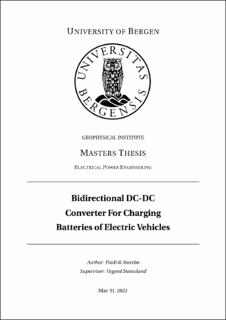Bidirectional DC-DC Converter For Charging Batteries of Electric Vehicles
Master thesis
Permanent lenke
https://hdl.handle.net/11250/2760960Utgivelsesdato
2021-06-01Metadata
Vis full innførselSamlinger
- Master theses [123]
Sammendrag
The popularity of electric vehicles has seen significant growth in the latest years. More electric vehicles are connected to the grid, and the load is increased consequently. The electric vehicle battery can be employed as a storage device for the grid by utilizing a bidirectional dc-dc converter. This process, referred to as vehicle-to-grid, requires an implemented control system for controlling the power flow between the battery and grid. By delivering power back in the grid when required, the peak load on the grid can be reduced. In this thesis the functionality and operation of an isolated bidirectional dc-dc converter for use with battery applications are reviewed, and a simulation model of a dc-dc converter with dual active bridge topology is implemented. Next, a control system with single phase shift modulation is implemented in the simulation model to regulate the power flow between the battery and grid. Finally, the transient response of the battery model utilized in the simulation is compared to a physical battery prototype system, which is constructed and implemented. The adaptable battery design allows for various voltage levels by connecting individual packs in series or parallel, depending on the requirement. The battery system is intended as a proof of concept, which can be developed further. A conference paper presenting the transient response comparison between the battery prototype designed in this thesis and a supercapacitor is submitted for review for the IEEE ICECCME 2021 conference.
